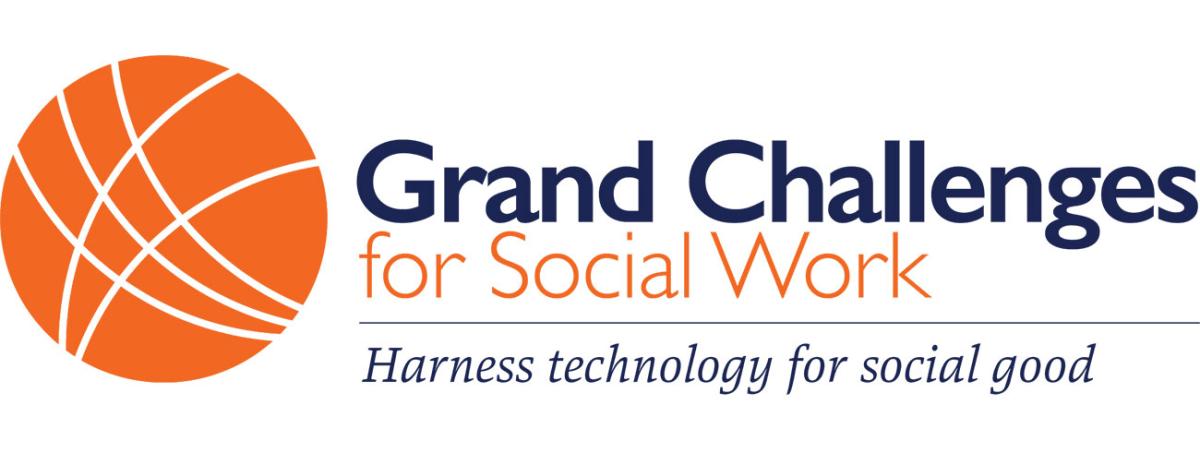Launched by the American Academy of Social Work and Social Welfare (AASWSW) in 2016, the Grand Challenges for Social Work (GCSW) are groundbreaking initiatives meant to champion social progress that is powered by science. They are a call-to-action for those within and outside the profession of social work to collaborate together and tackle our nation’s toughest social problems.
There are 13 Grand Challenges divided into three categories:
Individual and family well-being
- Ensure healthy development for youth
- Close the health gap
- Build healthy relationships to end violence
- Advance long and productive lives
Stronger social fabric
- Eradicate social isolation
- End homelessness
- Create social responses to a changing environment
- Harness technology for social good
Just society
- Eliminate racism
- Promote smart decarceration
- Build financial capability and assets for all
- Reduce extreme economic inequality
- Achieve equal opportunity and justice
This month, the Mandel School is focusing on our faculty members' work towards the Harness Technology for Social Good Grand Challenge.
Harness Technology for Social Good
The Issue
The social work sector has a long tradition of addressing the most vexing social problems and collecting rich data to serve marginalized and vulnerable people. Emerging technologies offer opportunities to accomplish this work in new ways. In a high-tech future, the social work profession needs to move away from low-tech solutions and create tech-responsive policies, leverage analytic techniques developed for big data, and engage in technology-mediated practice.
Societal Goal
Information and communication technology (ICT) can be deployed to improve the efficacy of social programs, accelerate the pace of social discovery, and transform the social work profession to respond in ways that ensure technology is ethically used to reduce the inequalities that exist today.
A Decade of Work
Over the next ten years, researchers, practitioners and policymakers can engage in a variety of activities that will advance this Grand Challenge and ignite social work achievements, including efforts to:
- Expand internet connectivity for underserved households.
- Develop cross-state practice parameters that would facilitate the growing trend of telehealth and online service delivery in order to reach isolated populations.
- Create policy that employs linkage of government data to allow cross-system data sharing and mining for research, program evaluations and policy analysis.
- Attract, train and retain a generation of social workers who will apply big data for social good and integrate ICT into social work practice.
- Develop, test and refine new interventions that use technology such as mobile apps, gamification, big data and the internet in social work practice.
- Initiate and foster stronger interdisciplinary partnerships and collaborations with technologists, computer scientists, software engineers and business management.
- Create a new set of standards in curricula and pedagogy that support technology inclusion in learning and practice across all social work schools.
- Expand data access and use through investment in systematizing and standardizing technological policies and practices.
Claudia J. Coulton and Francisca García-Cobián Richter recently discussed their work towards this Grand Challenge. Coulton is the Lillian F. Harris Professor of Urban Research and Social Change, a Distinguished University Professor, and the founding director of the Center on Urban Poverty and Community Development. She served on the committee of AASWSW that launched the Grand Challenges for Social Work and convened a group to author one of the two background papers that lead to the creation of the Harness Technology for Social Good Grand Challenge. Coulton is now one of the network co-leads on this Grand Challenge. Richter is a research assistant professor at the Mandel School.
How is the Mandel School working towards the Harness Technology for Social Good Grand Challenge?
Most recently, Francisca Richter, in collaboration with the Case School of Engineering, helped create the new Certificate in Data Sciences for Social Impact in face of the ever-growing trend of the use of scoring algorithms to inform human decision making in social welfare. Approved to be offered in the 2021–22 academic year, the certificate will empower professionals and graduate students in social work and other fields to navigate and influence this new era of technology and data-driven solutions, ensuring that proper ethical guidelines are developed and followed.
Richter also launched an interdisciplinary course last winter on data science and ethical issues called Social Data Analysis and Racism – Then and Now. The one-credit class uses Directed Acyclic Graph (DAG) causal diagrams to explore early social science analyses linking race to crime, contemporary uses of data algorithms, and the ethical considerations around them. Drawing from the work of historian K. G. Muhammad, the class studies the nascent U.S. social sciences scholarship of the early 1900’s that lead to connecting race with crime. They use a graphical toolkit for causal modeling, developed by computer scientist and philosopher Judea Pearl, to identify the flaws in these analyses and explore the counterarguments presented by Black scholars and activists. The class then applies these tools and historical knowledge to discuss the potential risks and benefits of current social algorithms in the areas of policing, child welfare and health services, and reviews the ethical frameworks that have been proposed to ensure these tools serve the social good. Richter also teaches how prominent social scientists and statisticians used the 1890 census and prison statistics to make incorrect causal claims portraying Black citizens as criminals, and discusses the work of Black scholars and activists whose carefully crafted counterarguments hinged on data, logic and domain-expert knowledge.
History provides a cautionary tale for those who use data for purposes related to social welfare. As Judea Pearl underlines, we cannot learn much from data—even big data—without knowledge or hypotheses about the data generating process. The assumptions embedded in the analysis of data should be informed by contextual knowledge and made explicit in the analysis, as these assumptions matter for the inferences we draw from them. Ethicists, historians, social scientists, social workers, computer scientists, engineers and community members represented in the data will be better prepared to harness the power of data and technology for social good when listening to each other and working collaboratively. Only then will we have a chance to dismantle structural racism and thrive for a truly equitable and just society.
– Francisca García-Cobián Richter
Leveraging Administrative Data to Better Serve Children and Families
The Center on Urban Poverty and Community Development is a leader in applying data science tools for social good. The Mandel School is among the first schools of social work to build a multi-sector integrated data system and use it to inform policy and programmatic solutions related to racial and economic disparities.
An Integrated Data System Lens into Evictions and their Effects | Public Assistance and Homeless Shelter Trajectories
Our faculty and staff often publish research that draws on linked administrative records data. Their work on evictions has been used to inform advocacy for the newly instituted Right to Counsel and was featured in a special issue of Housing Policy Debate focused on evictions. Their work on homelessness was featured in a special issue on the Dynamics of Homelessness in The ANNALS of the American Academy of Political and Social Science.
Cleveland Lead Safe Initiative
Our faculty and staff also provided the evidence that local coalitions needed in order to pass legislation to require rental housing in Cleveland to meet lead-safe standards. Now that the law is being implemented, the Poverty Center is serving as the Lead Safe Auditor, as required in the legislation, under the direction of Robert L. Fischer, co-director of the Poverty Center and chair of the Master of Nonprofit Organizations Program.
Facing and Confronting Racism in Social Work Research, Teaching and Practice
Francisca Richter and Meghan Salas Atwell, associate director of the Poverty Center and senior research associate, also presented as part of an Anti-Racism Workshop Series hosted by the school.
- Confronting Systematic Racism in Administrative Data | Meghan Salas-Atwell | Nov. 20, 2020
- Staff and faculty at the Poverty Center have been engaged in examining how and where systematic racism exists in administrative data. They have used a Toolkit developed by the Actionable Intelligence for Social Policy (AISP) at the University of Pennsylvania as a guide to help them understand and examine where and how systematic racism exists, and to discuss ways to address these issues in their research.
- Examining Racism Using Data Algorithms | Francisca Richter | Dec. 11, 2020
- As an example of a possible outcome of addressing systematic racism in research, Richter, working with big data, is examining the use of algorithms. She is currently developing a data science course that will address these issues.
Other Mandel School faculty members' work towards the Grand Challenges
Stay connected with the Grand Challenges for Social Work
The GCSW publishes a monthly newsletter to highlight Grand Challenges-related activities at universities and partner organizations, including, but not limited to, research, curriculum, classroom and student projects, policy activities and practice-based work. Submissions from within and outside the profession of social work are welcome, as the 13 Grand Challenges are goals for society and require interdisciplinary collaboration. Due by the 10th of each month, the monthly themes are:
- January: Eliminate racism
- February: Achieve equal opportunity and justice
- March: Promote smart decarceration
- April: Build financial capability and assets for all + Reduce extreme economic inequality
- May: Ensure healthy development for youth
- June: Eradicate social isolation
- July: Harness technology for social good
- August: Create social responses to a changing environment
- September: Advance long and productive lives
- October: Build healthy relationships to end violence
- November: End homelessness
- December: Close the health gap
Learn more about the Grand Challenges for Social Work.





